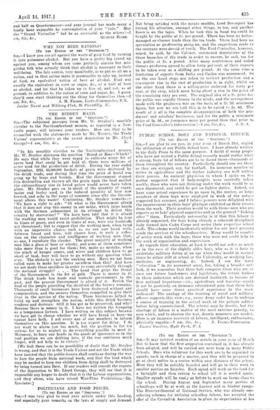SIR,—I ant glad to see you, in your issue of
March 31st, urging the utilization of our Public School boys. I have already written to the daily Press to the same purpose. I doubt if many people who have not visited a Public School recently would realize what a strong, lusty lot of fellows are to be found there—thousands of them throughout the country. Particularly should one see them as they are stripped, say, for football. An immense number of duties in agriculture and the timber industry are well within their powers. An eminent physician to whom I spoke on the matter suggested that if body-weights were carefully taken weekly, those who were not thriving under the work would be at once discovered, and could be put on lighter duties. Indeed, we have some actual experience to go upon ia.the matter, as large numbers of these boys were employed in work of the nature suggested last summer, and I believe parents were delighted with the improvement in their boys' physique exhibited on their return from the work. Their masters would be with them—men who are experts as to lads' physical capacities and in the general " looking after " them. Particularly noteworthy is it that this labour to already organized, the boys being already a coherent disciplined body formed into Cadet Corps and under their respective school staffs. The scheme would incidentally utilize for our most pressing needs the services of the schoolmasters. Many would he capable of active work with the boys; those who were not could help in the work of organization and supervision.
As regards their education, at least it would not suffer as much as in the case of the slightly older boys, who as it is have to undertake military duties at an ago when they would in normal times be either still at school or the University, or studying law, medicine, or engineering, &c. Indeed, I use the word "education" in its narrowest sense, for, taking a broader out- look, if we remember that these lads comprise those who are at once our future landowners and legislators, the future leaders in those industries which are destined forthwith to become of first national importance—viz., agriculture and forestry—would it not be positively an immense educational gain that these lads should have some direct practical experience in the work indicated? The analogy of the training of naval and military officers supports this view; e.g., every Army cadet has to undergo a course of training in the actual work of the private soldier before being commissioned. The scheme may be drastic, but the shortage of labour is a matter of the most extreme gravity, to ease which, and to shorten the war, drastic measures are needed. Here is an immense reservoir of labour, intelligent, enthusiastic,
physically capable.—I am, Sir, &c., J. FORBES-TOWNSHEND. Sussex Gardens, Hyde Park, Ile 2.


























 Previous page
Previous page